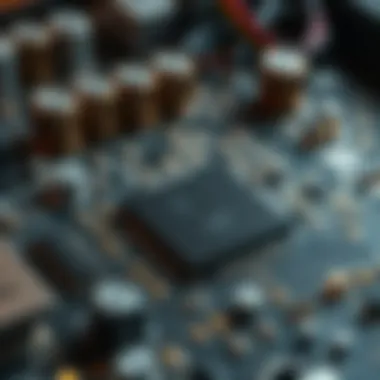Classic Modding and First Strike: A Deep Dive


Intro
The world of classic modding speaks volumes about user creativity and the desire to transform technologies into personalized experiences. In the realm of gaming and software applications, this phenomenon goes by many names: tweaks, hacks, mods. However, at its core, it stands as a testimony to human ingenuity, pushing boundaries of what's possible, to reconfigure existing frameworks into something intentionally unique.
Modding isn’t merely about choosing between the vanilla flavors of games or applications; it’s a canvas on which users can splash their preferences, catering to their needs and whims. It carries historical significance that stretches back to the early days of computing when enthusiasts sought to mold their products to better fit their view of usability. The first strike concept emerges as particularly noteworthy, highlighting the first moments of modification that lay the groundwork for deeper alterations and enhancements.
In this piece, we aim to navigate through the complex journey of classic modding. From the historical roots to the cultural implications and the nitty-gritty of APK modifications, the exploration centers on how these enhancements radically shift the user experience. We will also touch on the motivations driving people toward modding and what it means for developers and gamers alike. Modding can shift a mundane interaction into an invigorating encounter, breathing new life into technology, and elevating user engagement to a whole new level.
Each section that follows will unfold this narrative. We will delve deeper into safe practices in APK downloading, explore popular mods, and uncover the nuances of how these modifications enrich our digital interactions. So, buckle up, as we embark on this exciting exploration into the world of classic modding.
Understanding Classic Modding
Modding has established itself as an integral part of the digital landscape, especially within gaming and technology circles. Understanding classic modding goes beyond mere curiosity; it’s about recognizing how it reshapes user experiences, enhances creativity, and fosters community connections. In this rich territory, users become not just passive consumers, but active participants in their digital realms.
Definition and Overview
Classic modding refers to the practice of modifying existing software or hardware to create new functionalities, aesthetics, or entirely unique experiences. This process is chiefly associated with video games but has expanded into various software applications and even hardware configurations. The transformation can range from simple aesthetic tweaks, like changing textures or sounds, to complex overhauls that introduce new gameplay mechanics.
In the context of gaming, a mod is a tool for users to customize their experience. Classic modding gives users the power to influence every aspect of the game, which empowers personal expression and caters to individual tastes. There’s an undeniable jargon that surrounds this practice where terms like “mods”, “skins”, and “plugins” are thrown around, often accompanied by a sense of pride among the mod creators and users alike.
Historical Context of Modding
To appreciate classic modding, one must journey through its historical roots. The first inklings of modding can be traced back to the early days of computing. During the 1980s, early computer games like Doom and Quake encouraged users to develop their own tweaks for improved gameplay. The community embraced this creativity wholeheartedly, leading to a significant shift in how games were designed and experienced.
As technology advanced, so too did the scope of modding. The rise of the internet made it possible for modders to share their creations across the globe, igniting communities focused on improvement and innovation. Websites and forums dedicated to specific games became hubs for this creative exchange. From the launch of Half-Life and Counter-Strike to the emergence of massive community-driven mods, the history of modding is filled with user ingenuity and collaboration.
Cultural Significance of Modding
Modding speaks to a deeper cultural phenomenon. It exemplifies a kind of DIY spirit that resonates with many, allowing individuals to manifest their creativity and personal narratives through existing frameworks. In communities, it leads to collaborative efforts where developers, gamers, and artists join hands to create something that transcends the original design.
The narratives created by mods often reflect social and political undercurrents, providing a canvas where users express their thoughts and emotions. In countless instances, modding has given western fans a voice in games that initially didn’t cater to their preferences. This cultural significance underscores the importance of understanding classic modding—it's not just about the code or the pixels; it's about the relationships, the stories, and the collective journey we embark upon as a community in that digital sandbox.
"In a world increasingly dictated by corporate entities, modding embodies the social fabric that weaves together creativity and autonomy."
As we explore the various facets of modding, it's essential to appreciate the interplay between technology, creativity, and culture. Classic modding not only challenges the status quo but also opens new doors and possibilities for the gaming experience and user engagement in technology.
The Concept of First Strike
In the world of classic modding, understanding the concept of first strike is crucial for both gamers and developers. It signifies the initial touchpoint for creativity and innovation, often shaping the direction of a game or application through modifications. When modders talk about first strike, they aren't merely referring to the initial phase of altering code; it serves as a launchpad for personal expression and community building. By diving deeper into this subject, we can unearth its significance across the gaming landscape, highlighting its advantages and the various considerations that come along with it.
Defining First Strike in Modding
First strike in modding refers to those pioneering modifications that set the stage for broader innovation. It’s about being the first to introduce a new feature, tweak gameplay mechanics, or enhance visual effects that capture the imaginations of users. For example, when players first embraced the idea of modded skins in games like Counter-Strike, it allowed for individual expression and instantly transformed community engagement.
The essence of a first strike can often be seen through the lens of creativity — it’s akin to being an artist with a blank canvas. The initial choices made by a modder can ripple through the gaming experience, influencing trends and inspiring future modifications. If you want to see a striking example, one of the first mods for The Elder Scrolls V: Skyrim was the SkyUI, radically changing the user interface and setting a new standard for mods that came after.
Notable First Strike Modifications
The narrative of first strike is filled with notable examples that have left indelible marks on the gaming community. Here are a few that stand out:


- Minecraft's "Too Many Items" Mod: This was one of the early mods that introduced inventory management tools that fundamentally changed how players interacted with the game world, paving the way for more complex enhancements in game mechanics.
- Half-Life Counter-Strike: Originally a mod for Half-Life, it became a phenomenon in its own right, illustrating how the first strike can morph from supplementary content to a standalone legend that has defined a genre.
- GTA San Andreas Multiplayer: A primetime example where players battled against one another well beyond the boundaries of the original game, showing how creative minds can execute a first strike on an expansive level.
These first strikes indicate a journey of transformation and adaptation — they reveal the diverse ways that initial modifications can capture the player’s imagination.
Impact of First Strike on User Experience
The impact of a first strike modification on user experience can’t be overstated. It often determines the longevity and relevance of a gaming title in a rapidly evolving landscape. Effective first strikes can lead to enhanced user engagement, retention, and even a boost in the game’s community following.
Consider the way mods breathe new life into titles that may otherwise fade into obscurity. They offer refreshing gameplay mechanics, making the existing experience feel new and exciting. The Skyrim modding community, for instance, has continuously developed features that enhance graphics, introduce new quests, and even expand lore, demonstrating how pivotal first strike mods are to user engagement.
"First strike mods can transform a mundane experience into something spectacular, significantly altering how users connect with the game world."
Additionally, the user experience is often shaped by how intuitive and accessible these modifications are. A mod that is difficult to install or doesn’t integrate well into the user’s gameplay can lead to frustration. Therefore, successful first strike modifications not only need to be creative but should also keep usability in mind, ensuring players can easily embrace new experiences.
Overall, the concept of first strike goes beyond just technical merit; it’s about unlocking potential and encouraging creative dialogue among users. It’s a gateway into a vast realm of possibilities that awaits those willing to delve into the captivating world of classic modding.
Motivations Behind Modding
The allure of classic modding runs deeper than mere curiosity; it's a compelling intersection of creativity and functionality. Understanding why individuals dive into modding can shed light on its significance in today’s digital landscape. From personal touch to enhanced user engagement, the motivations behind modding reflect various needs and desires that resonate with tech enthusiasts, gamers, and developers alike.
Personalization and Customization
At the heart of modding lies the drive for personalization. It's about taking something generic and spinning it into a tailored experience. For many, regular games or applications don’t quite cut it. Gamers might feel like cookie-cutter experiences lack emotion or uniqueness. Here’s where customization comes into play. Modding allows users to tweak aspects to resonate with their style or preferences.
Imagine a gamer who wants to revamp the look of their favorite character. They don’t just want to play; they want a digital avatar that reflects who they are. This desire fuels countless mod downloads. The trend even extends to game soundtracks, where users can replace mundane tunes with their favorite tracks to heighten the experience.
"To each their own! Personalization in gaming is akin to wearing a bespoke suit; it just fits better."
Enhancing Gameplay and Functionality
Modding goes beyond the surface. Many modders seek to enhance the core functions of applications and games. A user may find that the default gameplay lacks challenge, leading them to create a more difficult mod or introduce new mechanics to shift the dynamics entirely. For instance, in strategy games, modders often add new factions, units, or even entirely new scenarios to extend playability.
Additionally, some modifications can enhance performance, making games run smoother or load faster. Such technical improvements are not merely for the sake of vanity; they often solve issues that users encounter in the original version. Through modding, users blend the line between consumption and creation, resulting in a richer, more satisfying gameplay experience.
Community Engagement and Collaboration
Modding isn’t just a solo endeavor; it’s often a community effort. When individuals work together on mods, they foster a sense of collaboration that builds community ties. For many modders, sharing their creations on forums or platforms like Reddit and Discord is just as gratifying as the modding itself. Users exchange feedback, collaborate on projects, and celebrate each other’s successes, leading to a vibrant ecosystem of innovation.
Such collaboration often leads to a wealth of resources and tutorials that make it easier for newcomers to dip their toes into modding. The sense of belonging to a larger movement encourages participation and inspires individuals to push boundaries in their modifications. Users no longer feel isolated in their journeys; they find a supportive network willing to share insights and tackle challenges together.
In summary, the motivations behind modding encapsulate a blend of personal expression, functional enhancement, and community-driven collaboration. These factors intertwine to create a vibrant landscape that not only redefines user experiences but also enriches the culture surrounding classic modding.
Popular APK Mods and Their Features
Exploring the world of APK mods provides valuable insights for tech enthusiasts, gamers, and developers alike. This section highlights the significance of popular APK modifications and how they enhance gameplay and user experience. The ability to mold applications according to personal preferences offers profound benefits. Not only do mods bring creativity into the realm of software, but they also serve specific needs of users—those who wish for a richer or more tailored experience.
Overview of APK Modding
APK modding involves the alteration of Android Application Packages. Each modded APK can come with unique features, gameplay elements, or aesthetic changes that improve or customize the original game or application. However, to grasp the essence of APK modding, it’s crucial to note that it does not inherently violate laws; many mods are crafted to enhance the user experience, offering functionalities that developers may not have considered or committed to include.


In simpler terms, modding allows users to dive deeper into applications, giving them the ability to tweak settings, change game mechanics or even unlock an array of features locked in the original version. Through understanding the original architecture of APK files, modders put a creative spin on their favorite applications. Sometimes, they can even breathe new life into older games by introducing features unavailable in their original iterations.
Notable Examples of Classic Mods
Among the countless APK mods available, a few standout classics have paved the way for modern modding culture. Here are some prominent examples that showcase the creativity of the community:
- Minecraft Pocket Edition Mods: Open the door to infinite possibilities. Users can craft personalized worlds, add new creatures, or enhance survival elements.
- Among Us Mods: These mods can alter gameplay aspects, from unique roles to new graphics, making the game even more engaging.
- Grand Theft Auto: San Andreas Mods: This genre has a rich history of mods that change everything from character skins to complete missions and storylines.
- Pokemon GO Plus+: Innovative mods allow players to mess with spawn rates or even change where they can catch Pokemon.
These examples reveal how mods can take a beloved game and transform the experience, offering new features that keep players hooked and excited.
User Reviews and Community Feedback
User reviews and feedback are the backbone of modding culture. Engaging with community forums and platforms like Reddit or specialized modding websites can shed light on which mods to trust and which ones might not live up to the hype. Community feedback serves as a compelling guide for potential users looking to dive into modding.
For instance, users often share detailed descriptions of their experiences, helping others avoid pitfalls like malware or poorly designed mods. Reviews might include:
- Performance Improvement: Many mods improve gameplay speed and stability.
- Customization Options: Users frequently rave about unique features that help them personalize their experiences.
- Community Support: Active forums and social media groups often assist modders and users in troubleshooting or enhancing their mods.
Feedback, both positive and critical, helps foster a culture where improvement and innovation thrive. To stay on top of trends and ensure a quality experience, consider checking out community forums on Reddit, or follow relevant groups on Facebook.
In sum, exploring popular APK mods opens doors to a richer digital landscape. Each mod stands as a testament to user creativity, offering adaptations that enhance the original experience and spark a sense of collaboration among users.
Navigating the Technical Aspects
In the vast universe of classic modding, understanding the technical aspects is like knowing the lay of the land before setting sail. Dive deep into this segment, and you’ll see that every nuance of modding can significantly influence your overall modding journey. Without navigating through the technical terrain, modding can easily shift from an exciting adventure to a frustrating endeavor. Let's break down the crux of this topic by exploring the components that make up this intricate ecosystem.
Understanding APK Structure
Getting a handle on APK structure is crucial for anyone wanting to mod Android applications. An APK, or Android Package Kit, essentially acts like a package containing all the elements needed for a full app. It’s not just a bunch of files lying around.
An APK file is divided into various sections, each with its particular function:
- Manifest File: This file is the heart of any APK. It declares app permissions and components, letting the operating system know what to expect.
- Resources: This includes images, layouts, and strings - basically, all the visual and textual assets bedecking your app.
- Dex Files: These contain the compiled code written in Java, which is executed on the device.
- Native Libraries: If the app has native code, it’s stored here, usually written in C or C++.
Familiarizing yourself with these components can ease any confusion when modifying an APK. You can navigate the subtle pathways within and make alterations that enhance or change the original application.
Tools and Software for Modding
When it comes to modding, the right tools can make all the difference. There's a smorgasbord of applications available that cater to various aspects of modding, from simple tweaks to complex changes. Here’s a quick rundown of some commonly used tools:
- APKTool: This tool helps you decompile APKs, giving you access to the various components discussed before.
- JADX: A dex to Java decompiler, it turns compiled code back into a more human-readable format.
- Android Studio: While typically used for app development, it has features that can help in debugging and testing any modifications.
- Lucky Patcher: Often used for bypassing license verifications, it’s also handy for modifying certain types of apps.
Using these tools requires diligence and care. One wrong step can spoil your mod. But on the flip side, mastering these applications empowers you to transform an app as you see fit.
Safety and Security Considerations
When delving into the world of modding, safety and security aren't afterthoughts; they are paramount. Your device, personal information, and even the integrity of original applications can be at risk if proper precautions aren't taken. Here’s what to keep an eye out for:
- Source Verification: Always download mods or tools from reputable sources. A little investment in verifying can save you big troubles later on.
- Backup Everything: Before modifying, back up your data. It’s always better to be safe than to lose important files.
- Antivirus Protection: Keep your device secure with a reliable antivirus program. It helps catch malware that might come in disguised as a harmless tool.
- Understand Permissions: Mods might ask for more permissions than necessary, so it's better to question their need.


Mod responsibly. The thrill of customization is fantastic, but the cost of neglecting security protocols can be steep. Remember, in the modding world, a little vigilance goes a long way.
Ethics of Modding
The ethics of modding is a crucial conversation in the world of gaming and technology. It goes beyond just changing a few lines of code or adding new content; it touches on legal, moral, and cultural implications that can shape communities and influence perceptions of modding. As gamers and developers immerse themselves in this landscape, grasping the ethics of modding becomes vital.
One must consider various aspects when engaging in modding: respect for original creators, the balance of innovation versus imitation, and the impact mods have on gameplay and community dynamics. The beautiful dance between creativity and legality is at the core of this conversation, and navigating it requires a keen understanding of what is at stake for everyone involved.
Legal Aspects of Modding
In the realm of modding, legality is a double-edged sword. When modders, inspired by a passion for their favorite games, decide to create or modify content, they must tread carefully. While some developers, like CD Projekt Red or Bethesda, foster a supportive modding community and license their content for modification, others, such as Nintendo, maintain strict control over their intellectual property.
The legal gray areas can often become murky. For instance, when a mod alters the core mechanics of a game or includes copyrighted materials, it could inadvertently invite legal action. Some potential legal considerations include:
- Copyright Law: Defines what can be used without permission.
- End User License Agreements (EULAs): Often specify what is permissible or prohibited when using software.
- Fair Use: A concept that may protect modding in specific contexts but is often difficult to navigate.
"Arguably, the most significant challenge faced by modders is understanding where many legal lines exist regarding their modifications; without this knowledge, they risk legal entanglements."
Moral Considerations
Moral considerations in modding dive deep into the ethics of respect and fairness. Gamers often have a close attachment to the content they play, making the act of modifying it not just a technical exercise but a deeply personal endeavor. Here are some key moral angles:
- Respect for Creators: Modders should acknowledge the original creators’ efforts. Taking their work without credit can be considered unethical.
- Community Impact: Mods can change how a community interacts with a game. Positive mods encourage collaboration, while negative modifications can foster toxicity.
- Inclusivity: Ensuring that mods do not alienate players can have immense repercussions on the gaming community. It's important that modifications promote inclusivity rather than exclusion.
The Role of Copyright in Modding
Copyright stands at the crossroad of creativity and legality in modding. As modders create, they must navigate the landscape to not infringe on the rights of original creators. Understanding the role of copyright in this domain is paramount for anyone looking to engage in modding.
- Infringement Risks: Using copyrighted material without permission can lead to takedown notices or even lawsuits.
- Original Works vs. Adaptations: Where does one draw the line between inspired content and outright plagiarism? This distinction can make or break a modding project.
- Licensing Opportunities: Some creators provide licenses for their work to be modified, which can foster a healthy modding environment.
The Future of Classic Modding
As the digital landscape continues to evolve, classic modding stands at a crucial intersection. The future of this practice isn’t merely a fleeting trend; it’s about adapting to changes while keeping the spirit of creativity alive. This section will delve into several elements that define the trajectory of classic modding, as well as the benefits and considerations that accompany these developments.
Emerging Trends
One cannot overlook the rapid pace of change in the world of gaming and software development. Modding is becoming more inclusive, with a growing number of tools and communities that facilitate user participation. With platforms like GitHub and other coding repositories gaining traction, even novice modders now have access to powerful resources. This democratization of modding is noticeable in:
- Increased Community Collaboration: Enabling users to work together, share ideas and troubleshoot issues.
- Cross-Platform Mods: Many mods now work across different gaming systems, promoting accessibility.
- User-Generated Content: Game developers are more open to integrating user mods into their ecosystems, allowing smoother updates and enhancements.
These trends signal a shift towards more community-driven development and innovation in the classic modding space.
Technological Advancements and Their Implications
The realm of classic modding is heavily impacted by technological advancements. Innovations such as cloud storage, AI, and machine learning are enhancing how users develop and engage with mods. Specifically, the implementation of AI tools aids modders by:
- Streamlining Development: Assisting in coding and reducing the time spent on debugging.
- Personalization: Offering tailored experiences based on user preferences, cultivating a unique gameplay atmosphere.
- Enhanced Graphics: New graphics engines are enabling modders to deliver visuals that were previously unattainable.
These advancements pave the way for a more immersive and engaging user experience, pushing boundaries in creative expression and interactivity.
Anticipating User Adaptations
As technology advances and modding trends shift, users too must adapt to remain relevant in this dynamic environment. The following points illustrate expected behavioral shifts among users:
- Savvy Consumers: Gamers will likely demand more from their experiences, pushing developers to integrate advanced mods.
- Increased Use of Beta Testing: Gamers may gravitate towards early access mods, contributing feedback to shape functionalities before full releases.
- Focus on Community Ethics: With modding becoming more mainstream, users will place greater importance on respecting intellectual property and ethical considerations.
"The essence of modding involves pushing boundaries and redefining possibilities in technology."







